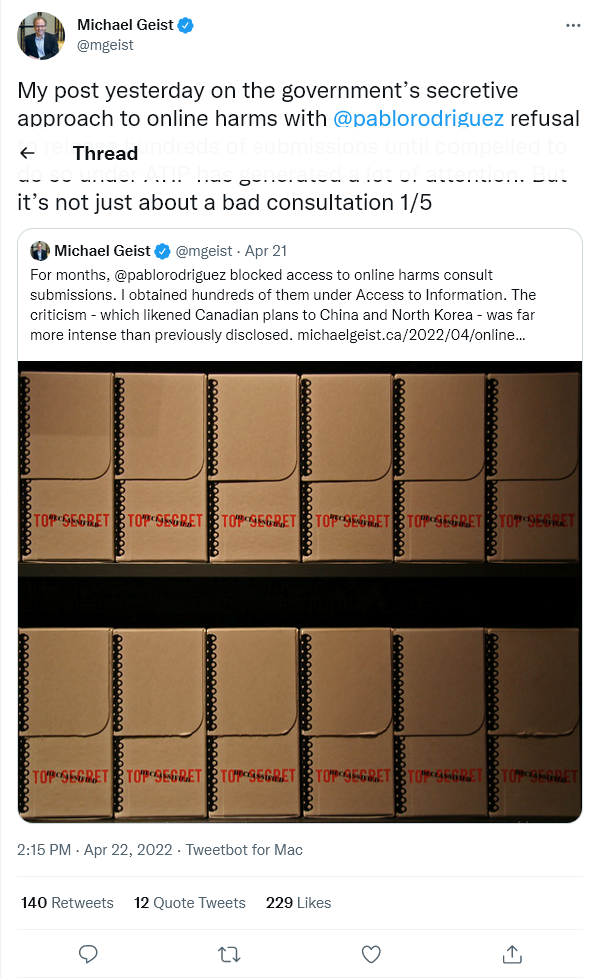The free segment of The Line‘s weekend round-up looked at the federal government’s gone-wrong public consultation about their proposed internet censorship Online Harms bill:
Your Line editors have been diligently seeking out educated comment about the Liberals’ forays into Internet regulation and censorship; as we suspected, they are finding out the hard way that determining which speech is fit to be heard is a philosophical fools’ errand. Only a very little research into the history of liberal norms around free speech could have spared them the trouble, but, alas, this seems to be the lesson that every generation needs to re-learn from first principles.
Well, a little out-of-school learning landed in the laps of the Liberals back in September of last year via a seven-page letter written by Michele Austin, then-Twitter Canada’s head of public policy. She took the government’s proposed Online Harms Bill to task in a submission that was only revealed when this country’s lone Internet warrior, Saint Michael Geist (*sign of the cross*), filed an Access To Information request revealing Austin’s scathing critique.
To wit:
Sacrifices freedom of expression to the creation of a government run system of surveillance of anyone who uses Twitter. Even the most basic procedural fairness requirements you might expect from a government-run system such as notice or warning are absent from this proposal. The requirement to “share” information at the request of Crown is also deeply troubling.
It’s rare to see a piece of proposed legislation so poorly conceived, so profoundly over-reaching, that virtually every organization asked to comment on it proves to be against it. But so it was. As Geist notes, even organizations that one would imagine to be at least nominally in favour of a regulatory regime intended to crack down on unequivocally harmful Internet carcinomas like child porn, hate speech, and terrorism, in fact came out against it. The National Association of Friendship Centres, Canadian Centre for Child Protection, Safe Harbour Outreach Project, Centre for Israel and Jewish Affairs, and the National Council of Canadian Muslims all noted that the government’s proposal stood to do much more harm to their respective communities than it would prevent.
Again, even a little bit of historical research would have demonstrated that those dastardly, evil, liberal values of “free speech” have traditionally done more to help marginalized communities than hinder them. But we digress.
Heritage Minister Pablo Rodriguez has subsequently announced the government would halt its Online Harms Bill, presumably in the wake of the disastrous consultation process. So the protests did, indeed, work. But as Geist rightly notes, the fact that he even had to spend months formally seeking out these submissions to be publicly released ought to raise serious questions about this government’s commitment to openness and transparency in how it approaches one of the most foundational freedoms we have as citizens. This is not a government that is philosophically well equipped, nor technically able, to control access to information in the way it so clearly wishes to. Something to keep in mind when evaluating its other Internet bills, C-11 and C-18.
I used to regularly post links to Michael Geist’s work, but at some point in the last few months his RSS feed went down and I stopped getting updates. I’ve relinked to his Twitter feed, which hopefully will provide notice when he publishes something on this file.
Today’s post identifies at least four problems. First, lack of transparency runs counter to promises of an open, transparent government. @justintrudeau even introduced a bill on open by default in 2014. Disclosures only via ATIP are not transparency. 2/5
Second, notion that the government was simply consulting on some ideas and will now course correct requires Canadians to overlook the reality that the actual plan was to introduce this as a bill last year. This was the Internet regulation plan. 3/5
Third, “What We Heard” report from @pablorodriguez significantly understated the extent of the public criticism and feedback. Recommendations omitted, criticisms softened. Having now seen the actual submissions, I feel misled. 4/5
Most importantly, this is part of a larger Internet regulation plan:
1️⃣Bill C-11 opens the door to regulating user generated content
2️⃣Bill C-18 mandates payments for links
3️⃣Online harms wasn’t an outlier. It reflects plan for regulating the Internet.
5/5





